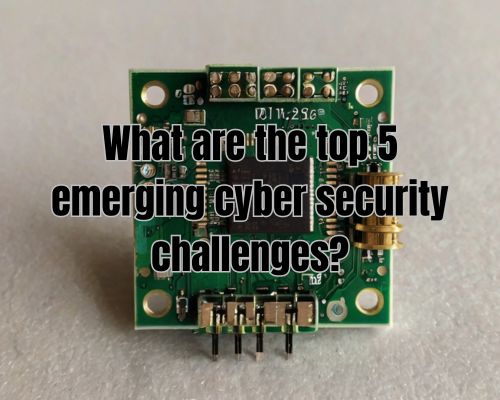What Are the Top 5 Emerging Cyber Security Challenges?
In today’s hyper-connected digital world, cyber security challenges continue to evolve, posing significant risks to individuals, businesses, and communities alike. For businesses and residents in West Palm Beach, Florida, understanding and preparing for these emerging threats is vital to maintaining a secure online presence and safeguarding sensitive information. This article explores the top five emerging cyber security challenges and offers insights to help protect yourself and your organization.

1. Ransomware as a Service (RaaS)
One of the most pressing cyber security challenges is the rise of Ransomware as a Service (RaaS). This business model allows cybercriminals to sell ransomware software to less experienced hackers, significantly expanding the pool of potential attackers. In West Palm Beach, businesses that rely on online transactions or store sensitive client data are prime targets for these attacks.
The consequences of ransomware are devastating, often resulting in the loss of critical data or hefty ransom payments. Protecting your organization involves implementing robust backup systems, educating employees about phishing schemes, and using advanced endpoint protection tools. See https://aliprivateinvestigatortampa.com/ for more.
2. IoT Vulnerabilities
The proliferation of Internet of Things (IoT) devices, such as smart thermostats, surveillance systems, and wearable tech, has created new vulnerabilities in cyber security. With many homes and businesses in West Palm Beach adopting smart technology, the risk of cybercriminals exploiting these devices to gain unauthorized access to networks has increased.
To mitigate IoT vulnerabilities:
- Regularly update device firmware.
- Change default passwords to strong, unique credentials.
- Segregate IoT devices on separate networks from critical systems.
Visit https://aliprivateinvestigatortampa.com/ for more.
3. Supply Chain Attacks
Cybercriminals are increasingly targeting supply chains to exploit vulnerabilities in third-party vendors. This type of attack often bypasses direct security measures by compromising less-secure partners within the supply chain. For businesses in West Palm Beach, particularly those in logistics, healthcare, or retail, the ripple effects of a supply chain breach can be catastrophic.
Steps to reduce this risk include:
- Conducting thorough security audits of vendors.
- Implementing zero-trust architecture within your organization.
- Monitoring third-party activity with advanced security tools.
4. Deepfake Technology
The rapid advancement of deepfake technology—which uses AI to create realistic but fabricated images, videos, or audio—poses a significant cyber security challenge. Deepfakes are increasingly used in scams, social engineering attacks, and disinformation campaigns, impacting individuals and businesses alike.
For example, a deepfake might imitate a business leader’s voice to authorize fraudulent transactions. Protecting yourself against this emerging threat involves:
- Training staff to identify suspicious communications.
- Using multi-factor authentication for sensitive operations.
- Staying informed about the latest advancements in AI security tools.
5. Cloud Security Misconfigurations
With more businesses in West Palm Beach moving their operations to the cloud, cloud security misconfigurations have become a critical concern. While cloud platforms offer flexibility and scalability, improper configurations—such as leaving storage buckets publicly accessible—can expose sensitive data to attackers.
Preventing cloud breaches requires:
- Regular security assessments of cloud environments.
- Leveraging built-in security tools offered by cloud service providers.
- Ensuring employees understand best practices for cloud security.
Local Insights: Why West Palm Beach is a Target
West Palm Beach, as part of South Florida’s growing tech hub, is home to numerous startups, small businesses, and enterprises across industries. This region’s economic vitality makes it an attractive target for cybercriminals looking to exploit valuable data. Furthermore, the city’s reliance on tourism and hospitality industries adds an additional layer of complexity, as these sectors frequently deal with customer payment information and personal data.
Local businesses must prioritize cyber security training for employees, as human error remains one of the top causes of breaches. Collaborating with local IT consultants and cybersecurity firms can help build a stronger defense against evolving threats.
How to Stay Ahead of Cyber Security Threats in West Palm Beach
- Invest in Training: Regular cyber security training can significantly reduce the risk of human error. This is particularly critical for businesses handling sensitive customer information, such as hotels and healthcare providers in the area.
- Adopt Zero-Trust Principles: A zero-trust approach assumes that every network request could be malicious. This strategy can reduce the likelihood of internal and external breaches.
- Partner with Local Cyber Security Experts: Leverage the expertise of West Palm Beach’s growing community of IT professionals. Local firms often understand the specific risks faced by businesses in this region.
- Leverage AI for Detection: AI-driven tools can help detect unusual network activity or prevent deepfake-related scams before they cause harm.
- Conduct Regular Audits: Ensure that all devices, software, and systems are up-to-date and compliant with the latest security protocols.
Final Thoughts: Building a Resilient Digital Future in West Palm Beach
Cyber security challenges are becoming more sophisticated, requiring individuals and businesses in West Palm Beach to stay proactive. From the rise of ransomware to the growing vulnerabilities in IoT devices, understanding these threats and taking preemptive measures can safeguard your digital assets.
By investing in advanced tools, conducting regular audits, and fostering a culture of security awareness, the West Palm Beach community can continue to thrive in an increasingly digital world. Protecting your business isn’t just about defending against today’s threats—it’s about preparing for tomorrow’s challenges.